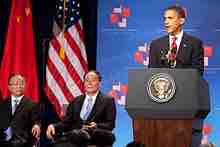Introduction
The president has many official and unofficial roles. The formal powers and duties of the president are outlined in Article II of the Constitution. Although the Constitution grants far fewer explicit powers to the president in Article II than it does to Congress in Article I, the ambiguity and vagueness of Article II have made it possible for presidents to expand their authority greatly beyond that specifically listed in the Constitution. The two passages in the Constitution that have provided the basis for the expansion of presidential authority are Article II, Section 1, which grants "the executive Power" to the president, and Section 3, which makes the president responsible for the enforcement of federal laws: "He shall take Care that the Laws be faithfully executed." As a result, "unofficial" presidential roles have evolved through both history and tradition.
As Chief Executive
Chief Executive is a term used for certain gubernatorial offices, expressing the nature of their job being analogous to a head of government. It is commonly used to refer to Presidential powers given by the constitution. As Chief Executive the president can: implement policy, supervise the executive branch of government, prepare an executive budget for submission to congress, and appoint and remove executive officials .

Obama Administration and Foreign Policy
President Barack Obama acts as the chief executive of the federal government of the United States.
As Head of Government
Head of government is the chief officer of the executive branch of a government, often presiding over a cabinet. In a parliamentary system, the head of government is often styled prime minister, chief minister, premier, etc. In presidential republics or absolute monarchies, the head of government may be the same person as the head of state, who is often also called a president or a monarch.
In a parliamentary system, the head of state is normally a different person from the head of government. This is in contrast to a presidential system in a democracy, where the head of state often is also the head of government, and most importantly: the executive branch does not derive its democratic legitimacy from the legislature. The Parliamentary system can be contrasted with a presidential system which operates under a stricter separation of powers, whereby the executive does not form part of, nor is appointed by, the parliamentary or legislative body. In such a system, congresses do not select or dismiss heads of governments, and governments cannot request an early dissolution as may be the case for parliaments. Since the legislative branch has more power over the executive branch in a parliamentary system, a notable amount of studies by political scientists have shown that parliamentary systems show lower levels of corruption than presidential systems of government.